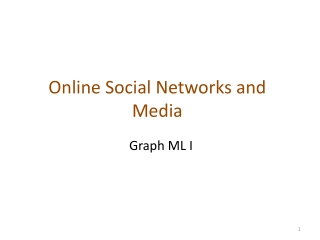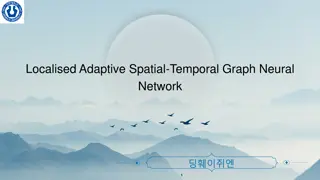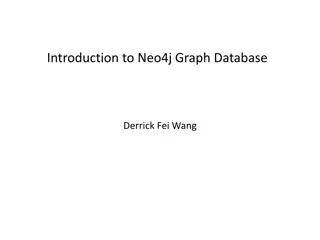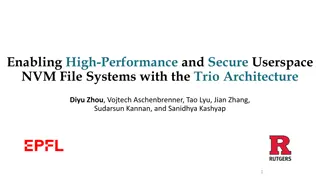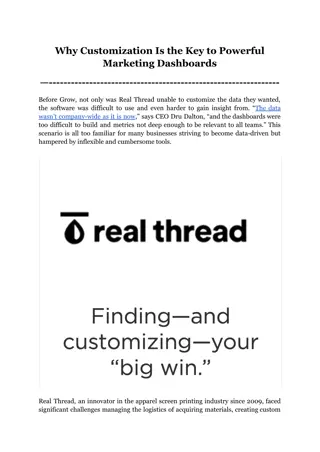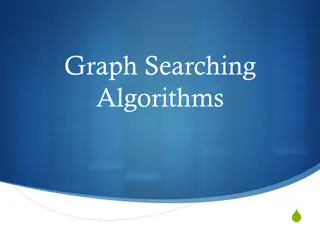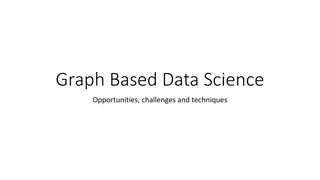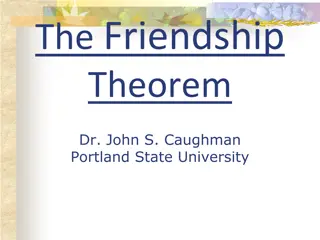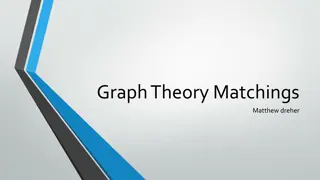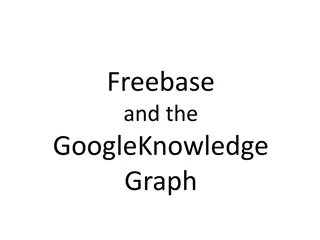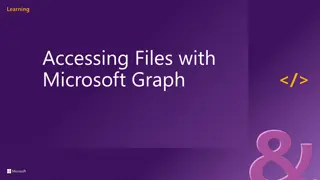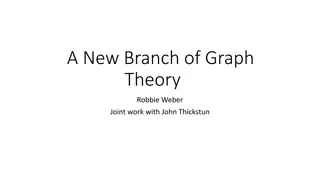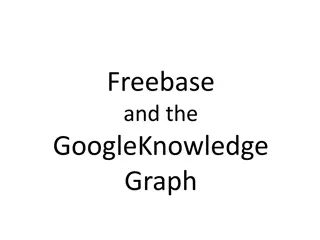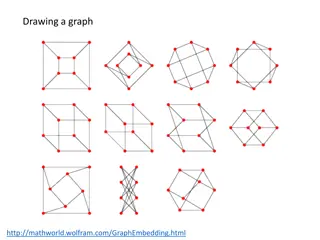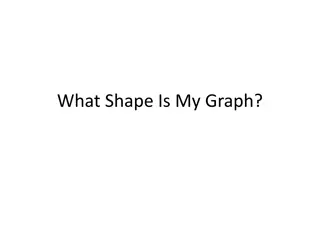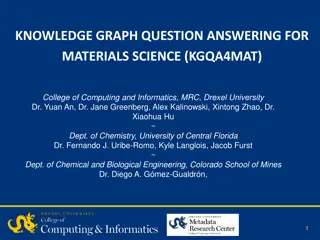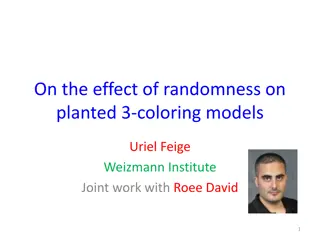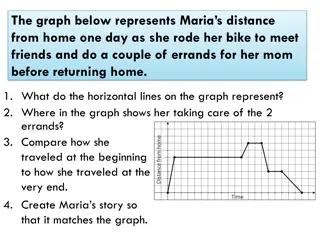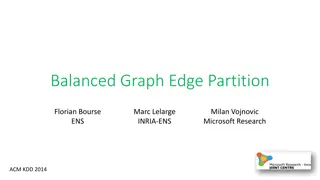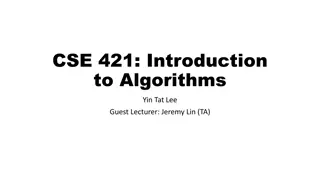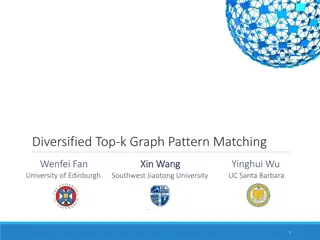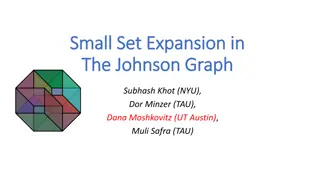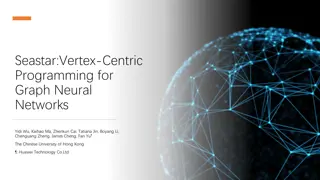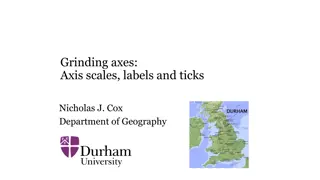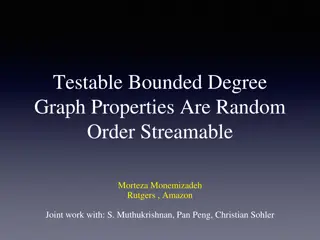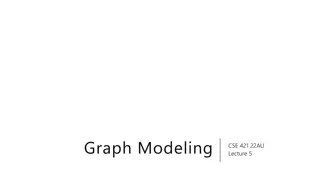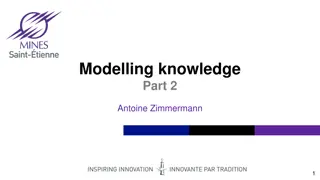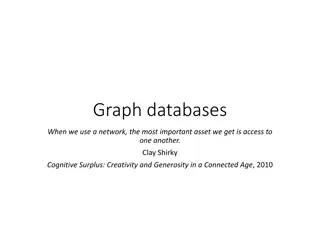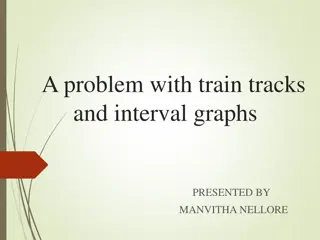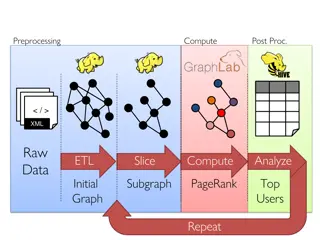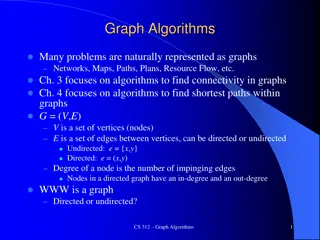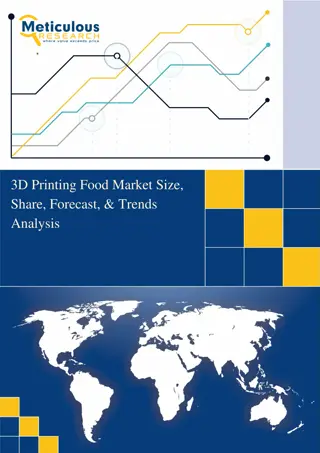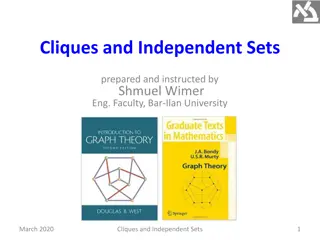Graph Machine Learning Overview: Traditional ML to Graph Neural Networks
Explore the evolution of Machine Learning in Graphs, from traditional ML tasks to advanced Graph Neural Networks (GNNs). Discover key concepts like feature engineering, tools like PyG, and types of ML tasks in graphs. Uncover insights into node-level, graph-level, and community-level predictions, an
3 views • 87 slides
Localised Adaptive Spatial-Temporal Graph Neural Network
This paper introduces the Localised Adaptive Spatial-Temporal Graph Neural Network model, focusing on the importance of spatial-temporal data modeling in graph structures. The challenges of balancing spatial and temporal dependencies for accurate inference are addressed, along with the use of distri
3 views • 19 slides
Graph Neural Networks
Graph Neural Networks (GNNs) are a versatile form of neural networks that encompass various network architectures like NNs, CNNs, and RNNs, as well as unsupervised learning models such as RBM and DBNs. They find applications in diverse fields such as object detection, machine translation, and drug d
2 views • 48 slides
Understanding Neo4j Graph Database Fundamentals
This comprehensive presentation delves into the fundamentals of Neo4j graph database, covering topics such as the definition of graph databases, reasons for their usage, insights into Neo4j and Cypher, practical applications like data flow analysis, and hands-on instructions on creating and querying
0 views • 20 slides
Enhancing Userspace NVM File Systems with Trio Architecture
This study explores the utilization of LibFS as an efficient solution for enabling high-performance and secure userspace NVM file systems. LibFS offers direct access to NVMs, minimizes software overhead, allows unprivileged customization, supports private customization for individual applications, a
0 views • 37 slides
Why Customization Is the Key to Powerful Marketing Dashboards
Discover why customization is essential for creating powerful marketing dashboards. Learn how tailored dashboards can lower acquisition costs, improve revenues, and enhance marketing efficiency.\n\nThis explores the specific features and benefits of a customized marketing reporting dashboard, suppor
1 views • 8 slides
Understanding Breadth-First Search (BFS) Algorithm for Graph Searching
This content delves into the Breadth-First Search (BFS) algorithm, a fundamental graph searching technique. It explains the step-by-step process of BFS, from initializing the graph to traversing vertices in a specific order. Through detailed visual representations, you will gain insights into how BF
1 views • 75 slides
Exploring Graph-Based Data Science: Opportunities, Challenges, and Techniques
Graph-based data science offers a powerful approach to analyzing data by leveraging graph structures. This involves using graph representation, analysis algorithms, ML/AI techniques, kernels, embeddings, and neural networks. Real-world examples show the utility of data graphs in various domains like
3 views • 37 slides
Understanding Graph Theory: Friendship Theorem and Freshman's Dream
Explore the intriguing concepts of the Friendship Theorem and Freshman's Dream in graph theory along with examples and visual illustrations. Learn about common friends, relationships between vertices and edges, and what defines a graph in a concise yet comprehensive manner.
0 views • 84 slides
Introduction to Graph Theory Matchings
Graph Theory Matchings have a rich history dating back to the 9th century AD. Distinct Representatives and Hall's Theorem play important roles in determining matchings in graphs. Understanding concepts like bipartite graphs, maximum matchings, and Hall's Marriage Theorem is essential in graph theory
1 views • 12 slides
Evolution of Freebase and the Google Knowledge Graph
Freebase was initially created in 2005 as an open shared database of knowledge, later acquired by Google and absorbed into the Google Knowledge Graph. Its approach included crowdsourcing updates and additions, focusing on data rather than text. The schema of Freebase included around 1500 types, 3500
1 views • 12 slides
Combining Graph Algorithms with Data Structures and Algorithms in CSE 373 by Kasey Champion
In this lecture, Kasey Champion covers a wide range of topics including graph algorithms, data structures, coding projects, and important midterm topics for CSE 373. The lecture emphasizes understanding ADTs, data structures, asymptotic analysis, sorting algorithms, memory management, P vs. NP, heap
0 views • 38 slides
Exploring Microsoft Graph: Accessing Files and Enhancing Microsoft 365 Platform
Uncover the power of Microsoft Graph through accessing files, extending Microsoft 365 experiences, and utilizing the gateway to Microsoft Cloud data. Learn about authentication options and how to interact with the Microsoft Graph Direct REST API.
1 views • 37 slides
Exploring Deep Graph Theory: Philosophical Implications and Misconceptions
Delve into the realm of Deep Graph Theory where graph theory statements are analyzed beyond their conventional scope to uncover philosophical insights and correct misunderstandings. Discover the essence of trees, forests, and the unique relationship where every tree is regarded as a forest. Addition
0 views • 13 slides
Evolution and Demise of Freebase and the Google Knowledge Graph
Freebase was launched in 2005 as an open database of knowledge, initially populated with Wikipedia data and later incorporating crowdsourced updates. Acquired by Google in 2010, it was transitioned into Google's Knowledge Graph before being decommissioned in 2016. The schema contained around 1500 ty
4 views • 12 slides
Understanding Graph Theory Fundamentals
Delve into the basics of graph theory with topics like graph embeddings, graph plotting, Kuratowski's theorem, planar graphs, Euler characteristic, trees, and more. Explore the principles behind graphs, their properties, and key theorems that define their structure and connectivity.
0 views • 17 slides
Understanding Graph Shapes and Descriptors
Learn how to identify different graph shapes such as symmetric, skewed, and uniform, and understand descriptors like unimodal and bimodal. Explore practical examples and visual aids to enhance your graph interpretation skills.
0 views • 19 slides
Association Rules with Graph Patterns: Exploring Relationships in Data
Dive into the world of association rules with graph patterns, where relationships and connections are analyzed through nodes and edges. Discover how to define association rules, identify customers, and uncover interesting patterns using graph-based techniques. Explore traditional and graph-pattern a
2 views • 18 slides
Advancements in Knowledge Graph Question Answering for Materials Science
Investigating natural language interfaces for querying structured MOF data stored in a knowledge graph, this project focuses on developing strategies using NLP to translate NL questions to KG queries. The MOF-KG integrates datasets, enabling query, computation, and reasoning for deriving new knowled
0 views • 13 slides
Solving the Professors to Coffee Lounge Problem: A Graph Theory Approach
An intriguing mathematical problem is presented where new faculty members at TIMS must be assigned to coffee lounge alcoves in a way that ensures no two new members meet after the first day. By constructing a graph based on meet-up timings, analyzing clashes, and determining intervals, this scenario
1 views • 19 slides
Exploring the Impact of Randomness on Planted 3-Coloring Models
In this study by Uriel Feige and Roee David from the Weizmann Institute, the effect of randomness on planted 3-coloring models is investigated. The research delves into the NP-hard nature of 3-coloring problems, introducing a hosted coloring framework that involves choices like the host graph and th
0 views • 55 slides
Managing Large Graphs on Multi-Cores with Graph Awareness
This research discusses the challenges in managing large graphs on multi-core systems and introduces Grace, an in-memory graph management and processing system with optimizations for graph-specific and multi-core-specific operations. The system keeps the entire graph in memory in smaller parts and p
0 views • 14 slides
Maria's Bike Journey Graph Analysis
Maria's bike journey graph depicts her distance from home as she rode to meet friends and run errands before returning home. The graph shows her stops for errands, changes in direction, and her path back home. By interpreting the key features of the graph, such as intercepts and intervals, we can an
0 views • 15 slides
Balanced Graph Edge Partition and Its Practical Applications
Balanced graph edge partitioning is a crucial problem in graph computation, machine learning, and graph databases. It involves partitioning a graph's vertices or edges into balanced components while minimizing cut costs. This process is essential for various real-world applications such as iterative
0 views • 17 slides
Advancing Widget Customization for a More Efficient Android Lock Screen
The digital world is evolving with emerging smartphone technologies and widget customization has become a crucial aspect of personalizing our smartphone experiences. And this widget customization reaches new heights with the innovative Glance screen.
2 views • 5 slides
Understanding Spanning Trees and Minimum Spanning Trees
Explore the concept of spanning trees and minimum spanning trees in graph theory through an in-depth lecture outline covering topics like Cut Property, Cycle Property, Kruskal's Algorithm, and more. Delve into the significance of Minimum Spanning Trees (MSTs) as the lowest-cost spanning tree of a gr
0 views • 41 slides
Graph Pattern Matching Challenges and Solutions
Graph pattern matching in social networks presents challenges such as costly queries, excessive results, and query focus issues. The complexity of top-k and diversified pattern matching problems requires heuristic algorithms for efficient solutions. Finding best candidates for project roles involves
0 views • 19 slides
Understanding Small Set Expansion in Johnson Graphs
In this detailed piece, Subhash Khot, Dor Minzer, Dana Moshkovitz, and Muli Safra explore the fascinating concept of Small Set Expansion in Johnson Graphs. The Johnson Graph is defined as a representation where nodes are sets of size K in a universe of size N, and two sets are connected if they inte
0 views • 14 slides
Understanding the Spotlight Effect in Brand Customization
Exploring how brand customization influences consumer behavior through the spotlight effect, which involves individuals overestimating the attention others pay to their possessions. This analysis focuses on the impact of customization on willingness to pay, uniqueness perception, and luxury vs. non-
0 views • 13 slides
Vertex-Centric Programming for Graph Neural Networks
Seastar presents a vertex-centric programming approach for Graph Neural Networks, showcasing better performance in graph analytic tasks compared to traditional methods. The research introduces the SEAStar computation pattern and discusses GNN programming abstractions, execution, and limitations. Dee
0 views • 17 slides
Mastering Graph Axes Customization: Techniques and Tricks
Explore advanced techniques for customizing graph axes by adjusting scales, labels, and ticks. Learn how to suppress ticks, modify label alignment, and work with non-standard scales like logarithmic or reciprocal. Discover ways to maintain consistent styles across a series of graphs and gain more co
0 views • 57 slides
Graph Property Testing and Algorithms Overview
Explore testable bounded degree graph properties, sparse graphs, d-bounded degree graphs, hyperfinite graphs, arboricity, maximum matching algorithms, and sublinear time approximation algorithms in graph data streams. Learn about various graph models and properties with examples, showcasing the impo
0 views • 53 slides
Understanding Graph Modeling and DFS Applications
Explore the world of graph modeling and DFS applications through lectures on graph vocabulary, edge classification in directed graphs, and the use of DFS to find cycles. Discover the significance of tree edges, back edges, forward edges, and cross edges in graph traversal. Learn how DFS can be utili
0 views • 32 slides
Graph-Based Knowledge Representation in Modelling: A Comprehensive Overview
This content delves into graph-based knowledge representation in modelling, detailing concepts such as recipe-ingredient relationships, formalisms for generalizing graph representation, and conceptual graphs by John F. Sowa. It explores how different interpretations describe the association between
0 views • 19 slides
Understanding Graph Databases and Neo4j
Graph databases offer a flexible way to manage data by representing relationships between nodes. Neo4j is a popular graph database system that uses Cypher for querying. This guide provides insights into graph database concepts, advantages, and getting started with Neo4j, including creating nodes and
0 views • 39 slides
Solving Train Track Problems Using Interval Graphs and Graph Coloring
Presented by Manvitha Nellore, this content addresses real-world train track problems in busy cities by proposing solutions through interval graphs and graph theory. The approach involves allotting tracks to trains by scheduling with time intervals to avoid conflicts. An interval graph is defined, a
0 views • 15 slides
Data Processing and Analysis for Graph-Based Algorithms
This content delves into the preprocessing, computing, post-processing, and analysis of raw XML data for graph-based algorithms. It covers topics such as data ETL, graph analytics, PageRank computation, and identifying top users. Various tools and frameworks like GraphX, Spark, Giraph, and GraphLab
0 views • 8 slides
Understanding Graph Algorithms for Connectivity and Shortest Paths
Graph algorithms play a crucial role in solving problems represented as networks, maps, paths, plans, and resource flow. This content delves into ways to find connectivity in graphs and algorithms for determining shortest paths. It discusses graph representations using adjacency matrices and lists,
1 views • 32 slides
3d food printing market
Increased product customization across industries is a major trend in the 3D printing space. Product customization is the process of delivering customized goods as per customers\u2019 needs. Mass customization of food products through 3D printing tec
1 views • 4 slides
Insights into Cliques and Independent Sets in Graph Theory
Exploring the concepts of cliques, independent sets, and theorems in graph theory regarding enemy relationships, maximum number of edges in 3-free graphs, and properties of multipartite graphs. The propositions and theorems discussed shed light on graph structures and their properties, providing val
0 views • 32 slides
